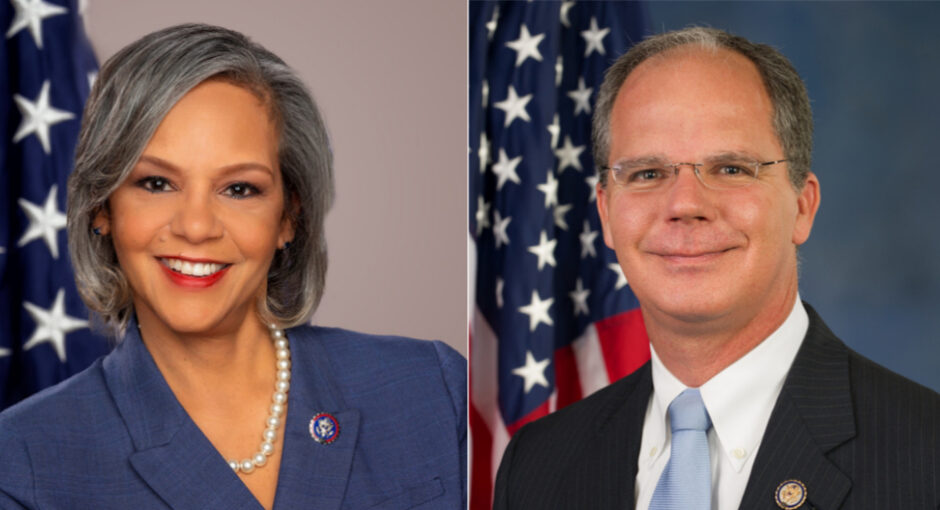The Democratic vice chair of the U.S. House Energy & Commerce Committee said during a media event yesterday she hopes Congress will address healthcare providers’ concerns about the 340B program during its lame duck session scheduled to end Dec. 15.
At the same event, the Republican who will chair the Energy & Commerce health subcommittee starting Jan. 3 said he hopes Congress during its next session will do more to make hospital prices transparent. He specifically cited as an example the difference between what hospitals pay for 340B-acquired drugs and what they charge private payers for those drugs.
In other congressional news, Democrats on Tuesday extended their Senate majority by one seat, to 51-49, with incumbent Sen. Raphael Warnock’s win over Hershel Walker in Georgia’s runoff election. The one-seat margin will give Senate Democrats more control over committees, nominations, and scheduling votes. In the House, Rep. Abigail Spanberger (Va.), a leader across party lines on 340B matters, was elected Tuesday to a new House Democratic Caucus leadership post. In party councils, she will speak for centrist Democrats in swing districts. The job raises Spanberger’s profile in the party nationally.
The remarks about Congress possibly acting on 340B came during a Wednesday morning event hosted by news organization Axios and sponsored by Pharmaceutical Research and Manufacturers of America. The topic was healthcare policy after the midterm elections.
Axios healthcare editor Tina Reed asked E&C Committee Vice Chair Robin Kelly (D-Ill.) what healthcare priorities “are you concerned won’t get done” during the lame duck session and “what are you really feeling optimistic about.” The E&C committee has primary jurisdiction over 340B.
“There’s a lot of concern about 340B,” said Kelly, who also is a member of the E&C health subcommittee. “I’m hearing a lot particularly from places that deal with HIV and AIDS. So I’m hoping we can do something around that.”
Kelly, who represents Chicago’s far southeast side and the city’s southern suburbs, is scheduled to meet today with staff at Chicago-based community health center Howard Brown Health to hear about the financial impact of drug manufacturer denials of 340B pricing when contract pharmacies dispense medicines. The center has a long history of serving patients living with HIV and AIDS.
In response to a request for comment on Kelly’s remarks, national group Ryan White Clinics for 340B Access yesterday pointed out that clinics “leverage their 340B savings to support the full HIV/AIDS care continuum, from diagnosis, to linkage to care, to medication adherence, and viral suppression rates far above the average national rate.”
Later during the Axios event, healthcare reporter Caitlin Owens asked Rep. Brett Guthrie (R-Ky.) if Congress should make hospital pricing information more accessible. Federal regulations implemented in 2021 require hospitals to post their standard charges for items and services online. Research published in JAMA in June found that only 5.7% of hospitals (300 out of 5,239 studied) were totally compliant six to nine months after the rule’s effective date. The government can impose civil monetary penalties for noncompliance, but so far it had fined just two.
“I don’t think we’re there yet with price transparency,” said Guthrie, who is expected to become chair of the E&C health subcommittee when Republicans become the House majority next month. “There was an example in the 340B program, it was in the New York Times, of a $25,000 drug that was sold to the hospital for $3,000 at 340B.”
Employers that offer health insurance are the ones that ultimately pay when a hospital charges an insurer full price for a drug they bought at a deep 340B discount, Guthrie said.
Guthrie said if his family’s automotive supply business sold a product to a car company “at a 4,000% markup, [we’d] be fired on the spot.”
Owens asked if legislation was needed. “I think so,” Guthrie answered. “We need to have hearings to see exactly what it is going to be, so we can see what we can do in a bipartisan way. I think that’s a bipartisan issue.”


